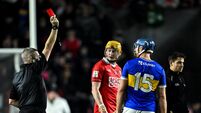Unanticipated aura of calm shields Kenny from Dáil’s slings and arrows
He’ll take on good ideas, but wouldn’t himself be a powerhouse of innovative notions like John Bruton. He’s got a lovely personality when you meet him, but wouldn’t be anything like as easy in front of a camera as Alan Dukes.
It goes on and on, the instinctive “give a thing, take it back” interpretations of Taoiseach Enda Kenny, predicated, as they always are, on the assumption that while there’s no harm in the Mayo man, he nonetheless fails to measure up to some inchoate definition of what constitutes a good leader.















